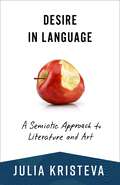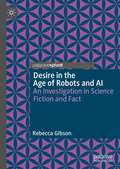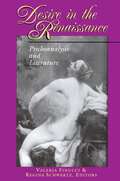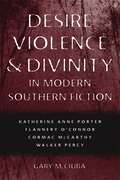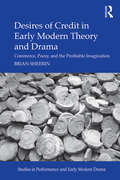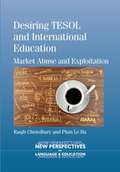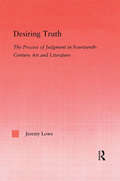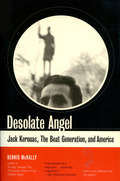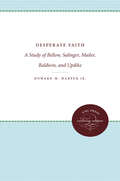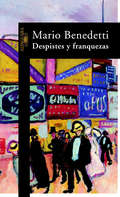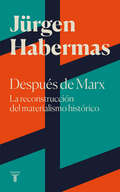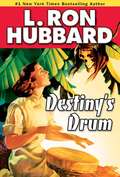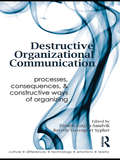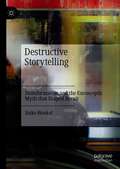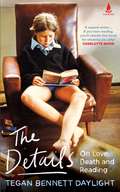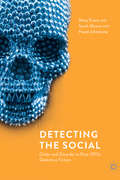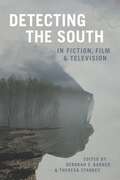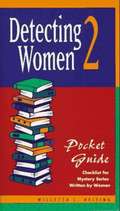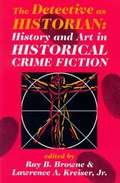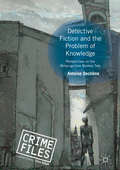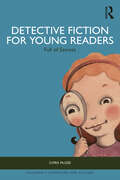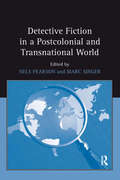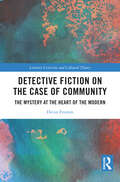- Table View
- List View
Desire in Language: A Semiotic Approach to Literature and Art (European Perspectives: A Series in Social Thought and Cultural Criticism)
by Julia KristevaDesire in Language presents a selection of Julia Kristeva’s essays that trace the path of an investigation, extending over a period of ten years, into the semiotics of literature and the arts. Probing beyond the claims of Sigmund Freud, Jacques Lacan, and others, Kristeva proposes and tests theories centered on the nature and development of the novel, and on what she has defined as a signifying practice in poetic language and pictural works. Desire in Language fully shows what Roman Jakobson has called Kristeva’s “genuine gift of questioning generally adopted ‘axioms,’ and her contrary gift of releasing various ‘damned questions’ from their traditional question marks.”
Desire in the Age of Robots and AI: An Investigation in Science Fiction and Fact
by Rebecca GibsonThis book examines how science fiction’s portrayal of humanity’s desire for robotic companions influences and reflects changes in our actual desires. It begins by taking the reader on a journey that outlines basic human desires—in short, we are storytellers, and we need the objects of our desire to be able to mirror that aspect of our beings. This not only explains the reasons we seek out differences in our mates, but also why we crave sex and romance with robots. In creating a new species of potential companions, science fiction highlights what we already want and how our desires dictate—and are in return recreated— by what is written. But sex with robots is more than a sci-fi pop-culture phenomenon; it’s a driving force in the latest technological advances in cybernetic science. As such, this book looks at both what we imagine and what we can create in terms of the newest iterations of robotic companionship.
Desire in the Renaissance: Psychoanalysis and Literature
by Valeria Finucci Regina SchwartzDrawing on a variety of psychoanalytic approaches, ten critics engage in exciting discussions of the ways the "inner life" is depicted in the Renaissance and the ways it is shown to interact with the "external" social and economic spheres. Spurred by the rise of capitalism and the nuclear family, Renaissance anxieties over changes in identity emerged in the period's unconscious--or, as Freud would have it, in its literature. Hence, much of Renaissance literature represents themes that have been prominent in the discourse of psychoanalysis: mistaken identity, incest, voyeurism, mourning, and the uncanny. The essays in this volume range from Spenser and Milton to Machiavelli and Ariosto, and focus on the fluidity of gender, the economics of sexual and sibling rivalry, the power of the visual, and the cultural echoes of the uncanny. The discussion of each topic highlights language as the medium of desire, transgression, or oppression. The section "Faking It: Sex, Class, and Gender Mobility" contains essays by Marjorie Garber (Middleton), Natasha Korda (Castiglione), and Valeria Finucci (Ariosto). The contributors to "Ogling: The Circulation of Power" include Harry Berger (Spenser), Lynn Enterline (Petrarch), and Regina Schwartz (Milton). "Loving and Loathing: The Economics of Subjection" includes Juliana Schiesari (Machia-velli) and William Kerrigan (Shakespeare). "Dreaming On: Uncanny Encounters" contains essays by Elizabeth J. Bellamy (Tasso) and David Lee Miller (Jonson).
Desire, Violence, and Divinity in Modern Southern Fiction: Katherine Anne Porter, Flannery O'Connor, Cormac McCarthy, Walker Percy (Southern Literary Studies)
by Gary M. CiubaIn this groundbreaking study, Gary M. Ciuba examines how four of the South's most probing writers of twentieth-century fiction -- Katherine Anne Porter, Flannery O'Connor, Cormac McCarthy, and Walker Percy -- expose the roots of violence in southern culture. Ciuba draws on the paradigm of mimetic violence developed by cultural and literary critic René Girard, who maintains that individual human nature is shaped by the desire to imitate a model. Mimetic desire may lead in turn to rivalry, cruelty, and ultimately community-sanctioned -- and sometimes ritually sanctified -- victimization of those deemed outcasts. Ciuba offers an impressively broad intellectual discussion that gives universal cultural meaning to the southern experience of desire, violence, and divinity with which these four authors wrestled and out of which they wrote.In a comprehensive analysis of Porter's semiautobiographical Miranda stories, Ciuba focuses on the prescribed role of women that Miranda imitates and ultimately escapes. O'Connor's The Violent Bear It Away reveals three characters whose scandalous animosity caused by religious rivalry leads to the unbearable stumbling block of violence. McCarthy's protagonist in Child of God, Lester Ballard, appears as the culmination of a long tradition of the sacred violence of southern religion, twisted into his own bloody faith. And Percy's The Thanatos Syndrome brings Ciuba's discussion back to the victim, in Tom Moore's renunciation of a society in which scapegoating threatens to become the foundation of a new social regime. From nostalgia for the old order to visions of a utopian tomorrow, these authors have imagined the interrelationship of desire, antagonism, and religion throughout southern history. Ciuba's insights offer new ways of reading Porter, O'Connor, McCarthy, and Percy as well as their contemporaries who inhabited the same culture of violence -- violence desired, dreaded, denied, and deified.
Desires of Credit in Early Modern Theory and Drama: Commerce, Poesy, and the Profitable Imagination (Studies in Performance and Early Modern Drama)
by Brian SheerinDesires of Credit in Early Modern Theory and Drama traces the near-simultaneous rise of economic theory, literary criticism, and public theater in London at the turn of the seventeenth century, and posits that connecting all three is a fascination with creating something out of nothing simply by acting as if it were there. Author Brian Sheerin contends that the motivating force behind both literary and economic inquiry at this time was the same basic quandary about the human imagination--specifically, how investments of belief can produce tangible consequences. Just as speculators were realizing the potency of collective imagination on economic circulation, readers and dramatists were becoming newly introspective about whether or not the 'lies' of literature could actually be morally 'profitable.' Could one actually benefit by taking certain fictions 'seriously'? Each of the five chapters examines a different dimension of this question by highlighting a particular dramatization of economic trust on the Renaissance stage, in plays by Marlowe, Shakespeare, Heywood, Dekker, and Jonson. The book fills a gap in current scholarship by keeping economic and dramatic interests rigorously grounded in early modern literary criticism, but also by emphasizing the productive nature of debt in a way that resonates with recent economic sociology.
Desiring TESOL and International Education
by Raqib Chowdhury Le Ha PhanThis book addresses how Western universities have constructed themselves as global providers of education, and are driven to be globally competitive. It examines how the term 'international' has been exploited by the market in the form of government educational policies and agencies, host institutions, academia and the mass media. The book explores matters relating to the role of the English language in international education in general and the field of TESOL in particular. It demonstrates how English and TESOL have exercised their symbolic power, coupled with the desire for international education, to create convenient identities for international TESOL students. It also discusses the complexity surrounding and informing these students' painful yet sophisticated appropriation of and resistance to the convenient labels they are subjected to.
Desiring Truth: The Process of Judgment in Fourteenth-Century Art and Literature (Studies in Medieval History and Culture #30)
by Jeremy LoweFirst published in 2005. Routledge is an imprint of Taylor & Francis, an informa company.
Desolate Angel: Jack Kerouac, The Beat Generation, And America
by Dennis McNally"A blockbuster of a biography . . . absolutely magnificent."--San Francisco ChronicleJack Kerouac--"King of the Beats," unwitting catalyst for the '60s counterculture, groundbreaking author--was a complex and compelling man: a star athlete with a literary bent; a spontaneous writer vilified by the New Critics but adored by a large, youthful readership; a devout Catholic but aspiring Buddhist; a lover of freedom plagued by crippling alcoholism.Desolate Angel follows Kerouac from his childhood in the mill town of Lowell, Massachusetts, to his early years at Columbia where he met Allen Ginsberg, William S. Burroughs, and Neal Cassady, beginning a four-way friendship that would become a sociointellectual legend. In rich detail and with sensitivity, Dennis McNally recounts Kerouac's frenetic cross-country journeys, his experiments with drugs and sexuality, his travels to Mexico and Tangier, the sudden fame that followed the publication of On the Road, the years of literary triumph, and the final near-decade of frustration and depression. Desolate Angel is a harrowing, compassionate portrait of a man and an artist set in an extraordinary social context. The metamorphosis of America from the Great Depression to the Kennedy administration is not merely the backdrop for Kerouac's life but is revealed to be an essential element of his art . . . for Kerouac was above all a witness to his exceptional times.
Desperate Faith: A Study of Bellow, Salinger, Mailer, Baldwin, and Updike
by Howard HarperThis book traces the developing view of the human conditions through the major works of these five writers. The method is inductive, and the works are seen as a record of human experience not as an illustration of philosophical theory. A final chapter places them in the larger perspective of traditional American fiction.Originally published in 1967.A UNC Press Enduring Edition -- UNC Press Enduring Editions use the latest in digital technology to make available again books from our distinguished backlist that were previously out of print. These editions are published unaltered from the original, and are presented in affordable paperback formats, bringing readers both historical and cultural value.
Despistes y franquezas: 1990 (Biblioteca Mario Benedetti Ser. #Vol. 15)
by Mario BenedettiUn libro que resume los modos de escritura de Benedetti al tiempo que constituye una suerte de conversación privada entre el autor y sus lectores de siempre. En él se reúnen relatos, poemas, graffitis, viñetas varias sobre esos aspectos de la realidad que siempre han cautivado a Mario Benedetti y que han hecho de él uno de los escritores más leídos y admirados de las letras hispánicas. Despistes y franquezas es, así, el complemento indispensable para todo conocedor de la obra del autor de La tregua y el comienzo ideal para quien quiera adentrarse en su escritura y en su visión del mundo. Crítica, ternura, denuncia, pasión, amor e Historia aparecen en sus páginas como esas claves que muestran a un escritor en la pura verdad de su universo propio.
Después de Marx: La reconstrucción del materialismo histórico
by Jurgen HabermasLaobra decisiva que fijó las bases de la teoría de la acción comunicativa de Habermas.En este libro indispensable, Jürgen Habermas llevó a cabo una exhaustiva revisión de la teoría marxista del materialismo histórico, marco conceptualtan influyente en Europa que, aun siendo objeto de una revisión crítica profunda, sigue teniendo un indudable poder estimulante.Inscribiéndose en el movimiento de crítica del análisis marxista de la sociedad y profundizando al mismo tiempo en ese análisis, el libro (publicado originalmente en 1976) aprovechó las nuevas aportaciones de las ciencias sociales para recomponer la teoría con unespíritu renovador y así alcanzar mejor la meta que esta se marcó, teniendo en cuenta el contexto de finales del siglo XX-totalmentetransformado por el capitalismo-. Este libro decisivo se propuso fundarunapolítica enraizada en el lenguaje, capaz de liberarnos de los engaños de la ideología, que obstaculizan la comunicación libre.
Destiny's Drum
by L. Ron HubbardBuckle up for adventure. When former captain of this army and that, Phil Sheridan, lands on the shore of the forgotten Indonesian island of Kamling--jewel of the Banda Sea--he's captured instead of welcomed by warriors of a primitive and bloodthirsty tribe. Marched to the natives' camp, he meets José Emanuel Batista--one-time slave trafficker, long-time murderer, and now self-appointed tyrant. Using his smooth-talking tongue and shooting skills to escape, Sheridan finds temporary shelter at the lodgings of a miner and his beautiful daughter. With limited arms and supplies to hold off Batista and his men, Sheridan must take a desperate chance and journey ever deeper into the jungle. His plan? Enlist the help of headhunters who may be more interested in his head than in driving out Batista's regime and ending its tyrannical reign. "Primo pulp fiction." --Booklist
The Destruction of Jerusalem in Early Modern English Literature
by Beatrice GrovesThis book explores the fall of Jerusalem and restores to its rightful place one of the key explanatory tropes of early modern English culture. Showing the importance of Jerusalem's destruction in sermons, ballads, puppet shows and provincial drama of the period, Beatrice Groves brings a new perspective to works by canonical authors such as Marlowe, Nashe, Shakespeare, Dekker and Milton. The volume also offers a historically compelling and wide-ranging account of major shifts in cultural attitudes towards Judaism by situating texts in their wider cultural and theological context. Groves examines the continuities and differences between medieval and early modern theatre, London as an imagined community and the way that narratives about Jerusalem and Judaism informed notions of English identity in the wake of the Reformation. Adopting an interdisciplinary approach, this volume will interest researchers and upper-level students of early modern literature, religious studies and theatre.
Destructive Organizational Communication: Processes, Consequences, and Constructive Ways of Organizing (Routledge Communication Series #Vol. 10)
by Pamela Lutgen-Sandvik Beverly Davenport SypherThis volume provides an in-depth consideration of destructive communication in organizations -- including workplace bullying, racism, stress, and harassment. It brings together communication scholars from theoretical and applied perspectives to assess current understandings, explore ways to integrate theory and practice, identify areas for change, and outline a research agenda for the coming decade. Each chapter examines a specific aspect of destructive organizational communication, reviews existing theory and research about that communicative form or ideology, suggests fruitful possibilities for application, and suggests key areas for further study. As such, the book opens a dialogue among communication scholars that explores destructive communication in organizations and addresses the following key components: the central issues and concerns regarding destructive organizational communication, current scholarly contributions to both applied and theoretical understanding of these issues, approaches to integrate applied/experienced and theoretical/conceptual perspectives in ways that inform one another and improve organizational considerations for varied stakeholders, and suggestions for a future research agenda for those interested in ameliorating the destructive side of organizational communication. Overall, the collection provides a basic understanding of the different types of destructive communication in organizations, the processes through which these interactions occur, the consequences to individuals and organizations, and the potential for organizing in more constructive, civil ways. This volume will be an excellent resource for scholars and researcher studying organizational communication, and graduate and advanced undergraduate students in organizational communication. It will also resonate with managers dealing with hostile workplaces, and organizational members trying to understand their current experiences. The book will serve as an excellent textbook for advanced undergraduate and graduate courses in organizational communication.
Destructive Storytelling: Disinformation and the Eurosceptic Myth that Shaped Brexit
by Imke HenkelThis book offers a new approach to understanding disinformation and its destructive impact on the democratic function of the news media. Using the notoriously false reporting of EU policies by the British press as a starting point, it utilises Critical Discourse Analysis to examine the linguistic properties of false news stories and to understand how they function as myth in Roland Barthes’ sense. The disinformation is essential for the impact these news stories had as it provides the simplification which creates the blissful clarity of myth that Barthes described. As myth, the false news stories depoliticised a political argument and naturalised the claim of antagonistic British-European relations. Henkel shows how news stories used disinformation to articulate a Eurosceptic myth of the feisty, witty Briton who stands up against the European bully. Her main argument is that the disinformation contributed to the Brexit vote because, as myth, it transported an ideology. Henkel argues that the Brexit debate and the news reporting that preceded it for decades can be understood as a case study for how political journalism becomes democratically dysfunctional. This book will be of interest to students and scholars of journalism, media and culture, political communication, and Critical Discourse Analysis.
The Details: On Love, Death and Reading
by Tegan Bennett DaylightA book about the connections we form with literature and each other Tegan Bennett Daylight has led a life in books – as a writer, a teacher and a critic, but first and foremost as a reader. In this deeply insightful and intimate work, Daylight describes how her reading has nourished her life, and how life has informed her reading. In both, she shows us that it&’s the small points of connection – the details – that really matter: what we notice when someone close to us dies, when we give birth, when we make friends. In life&’s disasters and delights, the details are what we can share and compare and carry with us. Daylight writes with invigorating candour and compassion about her mother&’s last days; her own experiences of childbearing and its aftermath (in her celebrated essay &‘Vagina&’); her long admiration of Helen Garner and George Saunders; and her great loves and friendships. Each chapter is a revelation, and a celebration of how books offer not an escape from &‘real life&’ but a richer engagement with the business of living. The result is a work that will truly deepen your relationship with books, and with other readers. The delight is in the details. &‘An intimate and wise celebration of the joy and solace we find in books.&’ Books & Publishing
Detecting the Social: Order And Disorder In Post-1970s Detective Fiction
by Hazel Johnstone Sarah Moore Mary EvansThis book analyses the ways in which twenty-first century detective fiction provides an understanding of the increasingly complex and often baffling contemporary world — and what sociology, as a discipline, can learn from it. Conventional sociological accounts of fiction generally comprehend its value in terms of the ways in which it can illustrate, enlarge or help to articulate a particular social theory. Evans, Moore, and Johnstone suggest a different approach, and demonstrate that by taking a group of detective novels, we can unveil so far unidentified, but crucial, theoretical ideas about what it means to be an individual in the twenty-first century. More specifically, the authors argue that detective fiction of the last forty years illuminates the effects of urban isolation and separation, the invisibility of institutional power, financial insecurity, and the failure of public authorities to protect people. In doing so, this body of fiction traces out the fault-lines in our social arrangements, rehearses our collective fears, and captures a mood of restless disquiet. By engaging with detective stories in this way, the book revisits ideas about the promise and purpose of sociology.
Detecting the South in Fiction, Film, and Television (Southern Literary Studies)
by Scott Romine Megan Abbott Jacob Agner Ace Atkins R. Bruce Brasell Phoebe Bronstein Gina Caison Claire Cothren James A. Crank Dominiqua Dickey Leigh Anne Duck Greg Herren Bob Hodges Suzanne Leonard Sarah Leventer Kristopher Mecholsky Yajaira M. Padilla Jacqueline Pinkowitz Harriet Pollack Riche Richardson Zackary Vernon Randall WilhelmDetecting the South in Fiction, Film, & Television, edited by Deborah E. Barker and Theresa Starkey, examines the often-overlooked and undervalued impact of the U.S. South on the origins and development of the detective genre and film noir. This wide-ranging collection engages with ongoing discussions about genre, gender, social justice, critical race theory, popular culture, cinema, and mass media. Focusing on the South, these essays uncover three frequently interrelated themes: the acknowledgment of race as it relates to slavery, segregation, and discrimination; the role of land as a source of income, an ecologically threatened space, or a place of seclusion; and the continued presence of the southern gothic in recurring elements such as dilapidated plantation houses, swamps, family secrets, and the occult. Twenty-two critical essays probe how southern detective narratives intersect with popular genre forms such as neo-noir, hard-boiled fiction, the dark thriller, suburban noir, amateur sleuths, journalist detectives, and television police procedurals. Alongside essays by scholars, Detecting the South in Fiction, Film, and Television presents pieces by authors of detective and crime fiction, including Megan Abbott and Ace Atkins, who address the extent to which the South and its artistic traditions influenced their own works. By considering the diversity of authors and characters associated with the genre, this accessible collection provides an overdue examination of the historical, political, and aesthetic contexts out of which the southern detective narrative emerged and continues to evolve.
Detecting Women 2: Pocket Guide Checklist for Mystery Series Written by Women
by Willetta L. HeisingIf you love the Fantastic Fiction website, you'll love Detecting Women 2. It's a small book of lists of series of women detectives with the authors and the books in the series. More than 600 series detectives created by women. Over 3400 mystery titles in correct series order.
Detectionary: A Biographical Dictionary
by Otto Penzler Chris Steinbrunner Marvin LachmanThe book contains a list of authors, titles, and publication years for detective fiction.
The Detective as Historian: History and Art in Historical Crime Fiction
by Ray B. Browne Lawrence A. KreiserReaders of detective stories are turning more toward historical crime fiction to learn both what everyday life was like in past societies and how society coped with those who broke the laws and restrictions of the times. The crime fiction treated here ranges from ancient Egypt through classical Greece and Rome; from medieval and renaissance China and Europe through nineteenth-century England and America. Topics include: Ellis Peter'sBrother Cadfael; Umberto Eco'sName of the Rose; Susanna Gregory'sDoctor Matthew Bartholomew; Peter Heck's Mark Twain as detective; Anne Perry and her Victorian-era world; Caleb Carr's works; and Elizabeth Peter's Egyptologist-adventurer tales.
Detective Fiction and the Problem of Knowledge: Perspectives on the Metacognitive Mystery Tale (Crime Files)
by Antoine DechêneThis book establishes the genealogy of a subgenre of crime fiction that Antoine Dechêne calls the metacognitive mystery tale. It delineates a corpus of texts presenting 'unreadable' mysteries which, under the deceptively monolithic appearance of subverting traditional detective story conventions, offer a multiplicity of motifs – the overwhelming presence of chance, the unfulfilled quest for knowledge, the urban stroller lost in a labyrinthine text – that generate a vast array of epistemological and ontological uncertainties. Analysing the works of a wide variety of authors, including Edgar Allan Poe, Jorge Luis Borges, and Henry James, this book is vital reading for scholars of detective fiction.
Detective Fiction for Young Readers: Full of Secrets (Children's Literature and Culture)
by Chris McGeeDetective Fiction for Young Readers is an examination of contemporary mystery stories for children and young adults. This volume explores how the conventions, rules, and expectations of adult mystery fiction have filtered down, so to speak, especially in the past several decades, to writing for younger readers. The book is organized into three sections that explore the whodunit, the hardboiled, and the metaphysical styles of mystery fiction. Furthermore, this text analyzes how each style has been adapted for a younger audience, acknowledging and exploring representative novels most in keeping with that style. This volume is ideal for students, academics, and readers interested in children’s mystery fiction that adheres to formulas made popular after the golden age of classic detective fiction.
Detective Fiction in a Postcolonial and Transnational World
by Nels PearsonTaking up a neglected area in the study of the crime novel, this collection investigates the growing number of writers who adapt conventions of detective fiction to expose problems of law, ethics, and truth that arise in postcolonial and transnational communities. While detective fiction has been linked to imperialism and constructions of race from its earliest origins, recent developments signal the evolution of the genre into a potent framework for narrating the complexities of identity, citizenship, and justice in a postcolonial world. Among the authors considered are Vikram Chandra, Gabriel GarcÃa Márquez, Michael Ondaatje, Patrick Chamoiseau, Mario Vargas Llosa, Suki Kim, and Walter Mosley. The essays explore detective stories set in Latin America, the Caribbean, India, and North America, including novels that view the American metropolis from the point of view of Asian American, African American, or Latino characters. Offering ten new and original essays by scholars in the field, this volume highlights the diverse employment of detective fictions internationally, and uncovers important political and historical subtexts of popular crime novels.
Detective Fiction on the Case of Community: The Mystery at the Heart of the Modern (Literary Criticism and Cultural Theory)
by Devin FrommDetective Fiction on the Case of Community uses one of the most popular forms of modern literature to examine one of modernity’s most trenchant problems. The project rests on the argument that detective fiction emerges specifically from an awareness of the stress that modernization puts on the possibilities of communal life, as industrialization and urbanism accelerate the alienation and atomization we recognize as modern conditions. Here the detective appears as an image of thinking still able to perceive the threads that link such alienated people together, and therefore able to imagine solutions along the lines of these obscured connections. Reading the genre’s journey, from its origins in Poe to its most unorthodox form in Pynchon, allows fresh perspectives on the possibilities and limits of modern community, from its endurance as part of modernization to its meaning today as a sticking point in theoretical debate and political activism.
